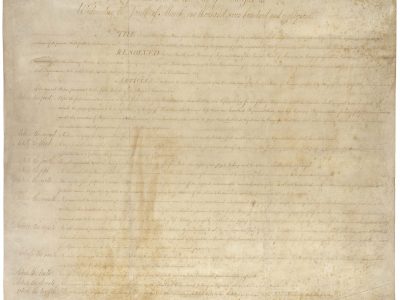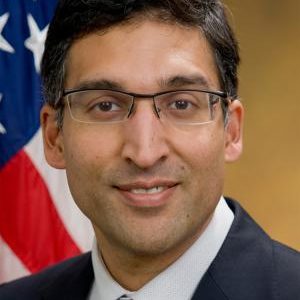 Five days is a lifetime in politics, and especially in the age of the internet. Donald Trump has – for now – given up on saying he can order governors to “reopen” their states, but the debate surrounding it has perverted our constitutional discussion. And that needs fixing. Wags from right to left – not …
Five days is a lifetime in politics, and especially in the age of the internet. Donald Trump has – for now – given up on saying he can order governors to “reopen” their states, but the debate surrounding it has perverted our constitutional discussion. And that needs fixing. Wags from right to left – not …
Continue reading "Federalism Is For Suckers"
The post Federalism Is For Suckers appeared first on Legal Planet.
#thedebate #inpolitics https://legal-planet.org/wp-content/uploads/2020/04/Bill_of_Rights_Pg1of1_AC-400x300.jpg https://legal-planet.org/2020/04/20/federalism-is-for-suckers/

Five days is a lifetime in politics, and especially in the age of the internet. Donald Trump has – for now – given up on saying he can order governors to “reopen” their states, but the debate surrounding it has perverted our constitutional discussion. And that needs fixing.
Wags from right to left – not to mention governors such as Andrew Cuomo — condemned Trump’s move as violating the principles of federalism. Both Neal Katyal and Liz Cheney suggested that it violated the Tenth Amendment. And both are wrong.
For environmentalists, getting this right is absolutely critical: polluters have relied on what they consider federalism to block challenge environmental regulations. The “Waters of the United States” rule famously discussed in Rapanos v. United States turned on federalism questions. So do many questions about the power to enforce the Endangered Species Act. Mistakes in assessing federalism, then, are very much an environmental question.
Trump’s assertion of power did not violate federalism in the least: instead, it violated the principle of the separation of powers. That is, as Bernie Sanders might say, is a YUGE difference. It is one that we must keep straight, for even though Trump has backed off his expansive claims, he rarely maintains consistency on anything, and in any event, it carries crucial implications going forward.

To see why, consider this hypothetical. Congress decides that an international pandemic requires a national response, and passes a bill ordering a nationwide shelter-in-place order to last 90 days. Donald Trump, unable to distinguish between a duly-enacted bill and a McDonald’s receipt, signs it. Unconstitutional?
Not in the least. The Constitution vests Congress with the power to regulate interstate commerce, and as the grisly economic statistics inexorably march forward, no one can deny COVID-19’s vast impact on the national economy. Indeed, as every public health expert has reiterated, the only way to resuscitate the economy is to effectively fight the virus. The Constitution also gives Congress the power to take any steps that are “necessary and proper” to effectuate its ends.
COVID-19 is a quintessentially national crisis. As many wags on social media have observed, having some states lock down and others stay open resembles having a urination section of a swimming pool: the problem will spread no matter what we do. Now, the crisis isn’t even national: it is international. It beggars belief to argue that Congress lacks power to regulate such a problem. That is especially true since public health experts argue that the national supply chain in a pandemic crisis must be federalized to avoid the inefficiencies that we now see with such critical material as ventilators, tests, and personal protective equipment. If Congress is expected to foot the bill for such material, then it also has the right to have a say in communities’ public health response to it.
Thinking about it this way reveals that the Constitutional outrage in Trump’s assertion lay not in federalism but rather in his assertion of unilateral Presidential power. The danger here lies in one person taking control of the entire economy through his (or her) own say-so – an action that has more than a whiff of dictatorial fiat.
By contrast, Congress comprises 535 people who, if they are going to pass sweeping regulation, must generate some sort of national consensus. The Constitution’s vesting of the power to regulate interstate commerce recognizes that such vast power can only be exercised when the nation has achieved reasonable consensus, reflected in legislative majorities, about proper action. If the country has such agreement, though, then no Constitutional principle forbids the national legislature from acting.
In fairness, federalism is not totally irrelevant here. In 1954, Herbert Wechsler wrote a celebrated article entitled “The Political Safeguards of Federalism.” Wechsler incisively observed that federalism plays a key role in the selection of members of Congress (even if he elided the point in the Jim Crow Era that much “federalism” was completely anti-democratic). Such a role obviously concerns the Senate, but even members of the House come from different states, and they are attentive to the interests of their states. Thus, the requirement for reasonable national agreement includes some deference to the wishes of states. As Wechsler insisted, however, that is a political safeguard, not a jurisprudential one. Trump’s assertion violated the separation-of-powers, not the 10th Amendment.
The distinction between federalism and separation-of-powers carries vast concrete significance. COVID-19 will not be the last pandemic of our lifetimes, and could last for several months if not well into 2021. In the future, we could have a national government far more responsive and science-based than a White House occupied by Donald Trump and a Senate led by Mitch McConnell. It must have the power to act, and not be constrained by a few anti-science governors. In recent days, we have seen the tragic results of stubbornly ignorant red state chief executives refusing to issue shelter-in-place orders: exponential increases in COVID-19 cases in their states – increases that threaten the rest of the nation.
Combatting such localized obtuseness is precisely why the Framers gave Congress regulatory authority. In our justified desire to resist arbitrary authoritarianism from the White House, we must remember that national crises require national solutions.
The post Federalism Is For Suckers appeared first on Legal Planet.
By: Jonathan Zasloff
Title: Federalism Is For Suckers
Sourced From: legal-planet.org/2020/04/20/federalism-is-for-suckers/
Published Date: Mon, 20 Apr 2020 14:44:55 +0000
Vist Maida on Social Me
Website Links
Maida Law Firm - Auto Accident Attorneys of Houston, by fuseology
PRESS RELEASE COVID-19 UPDATES
http://www.kake.com/story/41966303/covid19-maida-law-firm-is-open-and-fully-operational-during-this-crisis
No comments:
Post a Comment